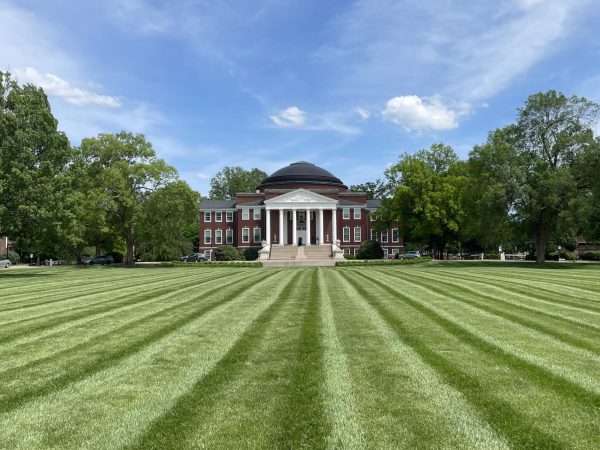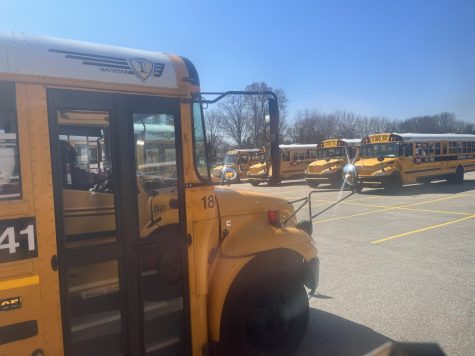OPINION: JCPS’s grading overhaul demonstrates ignorance and poor planning
August 13, 2021
This piece was submitted by Trenton Schroering (10, HSU).
Consider this: a student whose intelligence and passion is positively unmatched. Every single homework assignment is done to absolute perfection, as is every single in-class lesson sheet, every single study guide, and most every other supplemental worksheet that this student has ever done.
They are a genius, and there is no dancing around that fact. However, this student has a problem. They are unable to work under severe pressure. The weight of potential failure and the expecting eyes of peers is enough to send our student into panic attacks at the mere thought of taking a binding test. They cannot apply their intelligence to as high a degree due to the uncontrollable consequences of the way they were born.
Our student loses all regard of their accomplishments and talent and fails the class. They have to take supplemental classes, and may end up having to repeat the entire grade, just so they can re-learn information that they had mastered months prior. For many test-anxious geniuses across Jefferson County, this would become reality under a 10/90 grading system.
Jefferson County Public Schools has a standard system of grading that has remained relatively uncontroversial during the lifespan and educational careers of many incumbent JCPS students.
20 percent of students’ grades come from “engagement,” which is the teacher’s observation about how active the student is within class and how much passion they display through their work. Students demonstrate this through participation in class activities and interaction with peers in furtherance of academic fulfillment.
30 percent of their grade comes from “progression,” the typical mental image of traditional schoolwork. These are homework assignments, in-class activities, and smaller projects. They exist to show that the student has been comprehending the lessons that teachers deliver on a daily basis.
The last 50 percent comes from “mastery,” which encompasses the more grueling parts of school that many students tend to dread: long-term projects, tests, presentations and other assessments of knowledge. These tasks usually come up only once or twice every grading period. They are meant to give students the chance to prove that they’ve internalized all the information they heard over any specific period of time.
JCPS has discussed whether to retire the traditional 50/30/20 (mastery, progression, engagement) divide, and implement a 30/70 (progression, mastery). Not only has JCPS codified 30/70 for the coming school year, but also codified into law is the allowance of a jump to 10/90.
This is a poor decision that will set a toxic precedent going forward into the coming school year and have adverse effects that span the entire district. It will redefine how many students, teachers, parents and administrators format their interactions with the schooling system, and certainly not in a good way.
First off, I want to draw attention to the why behind it all. It seemed nonsensical upon my first viewing of the JCPS press release. I have now discovered that it is the intention of the JCPS Board of Education to implement a new standard of curriculum guidance known as “standard-based grading.”
Standard-based grading is an initiative to redefine how classwork operates. The intention is to slowly phase out worksheets, homework and “busy work” in favor of assignments that truly better the student’s mastery of a topic. It would also individualize curriculums to ensure that no student is left behind in their coursework.
“Tests” would also serve as not mere indicators that you could memorize the material, but genuine methods of gauging how much you understand the lessons your teachers taught you. It would also measure how well you could apply those lessons. This initiative was designed by teachers who saw the problem with standard grading systems and decided there needed to be a change.
All this overarching score overhaul does is affect the point allocations. It doesn’t provide guidelines on how teachers can apply it into their own instruction. I don’t doubt that the intention behind the change is to try and herd teachers into changing their curriculum to adopt standard-based grading, but in practice, I foresee many ways this can go wrong.
At Manual, for instance, there are classes (mostly AP) that have not changed their curriculum in the past several years. Standard-based grading is an initiative by teachers wanting change and not a comprehensive education policy enacting it.
You can’t make a change as impactful as overhauling the grading system on the basis that a mere implication may get teachers around the county to change their own classes dramatically.
If there’s not a sudden and noticeable change in the way that the grand majority of teachers frame their assignments, like the change in grading seems to be pushing for, then the policy will diminish the educational success of countless hardworking students.
There are no safeguards to ensure this initiative will actually have a genuine effect on how teachers frame their lessons, and even then, there are absolutely no policies that define what these new lessons should look like.
When removed from JCPS’s ideal and unlikely scenario, this type of grading benefits one type of student: those that are good under pressure and can test well. This leaves behind students that do not fit that mold. The abolishment of the engagement category only furthers this fear, for it means that students are no longer rewarded for actively putting visible effort into understanding material day-by-day.
If a stressed, unprepared, and unadvised teacher does not adapt in the short timeframe that JCPS is shoving upon them, it just means that unchanged course loads would be graded under a 10/90 scale. A hypothetical student could not do any of their progression assignments, like homework, and still carry an A in the class. It also means that if a given student doesn’t test well for a multitude of reasons, such as a mental disorder that inhibits focus, or simply not functioning well under pressure, then that student is now set up to fail.
I have never said that I believe that standard-based grading is worth disregarding; in fact, I admire it greatly. But doing it now? After students, teachers, and administrators have already had to adapt to so much? And doing it in this fashion, without proper overarches to advise teachers? It’s reckless at best, and at worst, damaging to the overall wellbeing of the student populace.
The groundwork for this type of change needs to be laid first before we start overhauling governing systems. Students are already collapsing to their knees in tears over the amount of just pure “busy work” many teachers assign, and if those teachers aren’t going to change, then the only thing that is going to be noticeably different next year is that those students’ hard work won’t matter. Less motivation. Less development. Less effort. Less learning.
For the good of all students, JCPS needs to fall back to the point of stability that was the 50/30/20 grading system. This is necessary until a more equitable and equal learning initiative can be realized. I want grading reform– and there is a part of me that wants exactly what JCPS were pushing for with the 10/90 overhaul– but not now and not like this.
This is not a protest of the idea. It is a protest of the poor, rushed and underfunded implementation that left the people it will affect out of the mix. We need to return to the system that we all are acquainted with until JCPS can develop a new one.
This unregulated change is disrespectful to the dedicated students who have already contended the challenge of a lifetime given the COVID-19 pandemic. NTI proved that, no matter how intelligent or passionate any given student may be, if you remove them from the circumstances in which they thrive, they will falter due to conditions that are no fault of their own.
I am not the only one making that assertion, either. 1,800+ JCPS residents have signed a petition to return to a 50/30/20 system until a new one surfaces, and their responses have delivered a crystalline message. Many are frightened of the effect that this poor implementation may have on their future.
Students should be judged on nothing but the quality of their knowledge, and the sudden snap into a 10/90 grading system (especially after the hardest year that many will hopefully ever have to experience in their entire lives) jeopardizes their present and their future.
Many students can not and must not be expected to thrive in a system that removes emphasis from almost every single worksheet they do and only places genuine value on the stress-ridden mastery assignments, which are already few and far between to begin with.
But it is worth mentioning that the opposite could occur, and it is these opposites that may have driven JCPS to make the aforementioned overhauls in the first place.
There are students who may not even possess the resources to complete assigned worksheets of their own accord, and there are those students whose genius only shows itself in applied testing and in mastery projects. The 10/90 split intends to raise these students up so that their brilliance can be cultivated and not cast aside.
I will close with the clarification that when I criticize the 10/90 proposal, I’m not throwing my hands up and saying that kids such as those can’t be helped because of the nature of the system. Nor am I saying that the other falterers who can’t thrive under a 10/90 system are somehow “more worthy” of having a policy that works for them. The ideal grading system that I wish to push for is equal and just for all, and the fact of the matter is that this “ideal grading system” already exists.
Standard-based grading is the best thing that could ever happen to any given student. It helps anyone and everyone by individualizing lessons and preventing anyone from lagging behind their peers due to factors that they can’t be expected to resolve. 10/90 means to implement this system, but in its isolated state, it implements it for some and not for all, tipping the scales instead of balancing them.
There is likely a student, at this very moment, curled up in their bed sobbing due to the already-inherent pressures that come along with the start of every given school year. In twenty years, that student may very well be back in a classroom, teaching the next generation of youth how to carry the torch of society onward into the future. These students are the future of humanity, and they deserve respect.
JCPS, this switch to 10/90, in its current state, is careless. Your ideas and your intentions are admirable, but your methods are worthy of a second, a third, and even a fourth look. It’s one step forward and two steps back, and on the path toward educational prosperity, we must keep moving exclusively forward. If we truly want the best for our children, there is no other option.

















